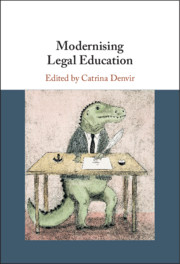Book contents
- Modernising Legal Education
- Modernising Legal Education
- Copyright page
- Contents
- Figures
- Tables
- About the Contributors
- Foreword
- Introduction
- 1 Do Lawyers Need to Learn to Code?
- 2 Experiential Legal Education
- 3 Skills Swap?
- 4 Scaling the Gap
- 5 Bringing ODR to the Legal Education Mainstream
- 6 Design Comes to the Law School
- 7 Developing ‘NextGen’ Lawyers through Project-Based Learning
- 8 Same As It Ever Was?
- 9 Ludic Legal Education from Cicero to Phoenix Wright
- 10 The Gamification of Written Problem Questions in Law
- 11 Virtually Teaching Ethics
- 12 Paths to Practice
- 13 ‘Complicitous and Contestatory’
- Afterword
- References
12 - Paths to Practice
Regulating for Innovation in Legal Education and Training
Published online by Cambridge University Press: 30 December 2019
- Modernising Legal Education
- Modernising Legal Education
- Copyright page
- Contents
- Figures
- Tables
- About the Contributors
- Foreword
- Introduction
- 1 Do Lawyers Need to Learn to Code?
- 2 Experiential Legal Education
- 3 Skills Swap?
- 4 Scaling the Gap
- 5 Bringing ODR to the Legal Education Mainstream
- 6 Design Comes to the Law School
- 7 Developing ‘NextGen’ Lawyers through Project-Based Learning
- 8 Same As It Ever Was?
- 9 Ludic Legal Education from Cicero to Phoenix Wright
- 10 The Gamification of Written Problem Questions in Law
- 11 Virtually Teaching Ethics
- 12 Paths to Practice
- 13 ‘Complicitous and Contestatory’
- Afterword
- References
Summary
Most agree that lawyers of the future will need a greater understanding of how technology can be used to design and deliver legal services. The issue for those involved in setting content for any route to qualification is defining the extent to which this must be regulated, as much as identifying the right level of technological capability. The issue is not merely one of content, but the acquisition of competences. Any accreditation must look beyond simply ensuring capability in relation to discrete tools, looking instead to ensure that future solicitors have the ability to adapt to new technologies. Separately, consideration has to be given to the emerging profession of legal technologists. Whilst some technologists may be legally qualified, those that are not must understand the ethical boundaries and regulatory requirements that lawyers work within. The organisation of the legal profession and the regulatory boundaries shared between various stakeholders require us to consider whether accreditation is the right way forward, where responsibility for accreditation should lie and who should take initiative in this space. This chapter explores these issues by contrasting the approach adopted by the Solicitors Regulation Authority in England and Wales with that of the Law Society of Scotland.
Keywords
- Type
- Chapter
- Information
- Modernising Legal Education , pp. 221 - 238Publisher: Cambridge University PressPrint publication year: 2020

